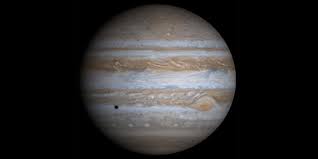Jupiter
英 ['dʒuːpɪtə]
美 ['dʒʊpətɚ]
TEM4 CET6
Jupiter 朱庇特,木星古罗马神话主神,来自拉丁语Iupeter,来自PIE*dyeu-peter,众神之父,来自*dyeu,神,词源同divine,Zeus,*peter,父亲,词源同father,paternal.后用来命名木星。
- Jupiter
- Jupiter: see jovial
- Jupiter (n.)
- c. 1200, "supreme deity of the ancient Romans," from Latin Iupeter, from PIE *dyeu-peter- "god-father" (originally vocative, "the name naturally occurring most frequently in invocations" [Tucker]), from *deiw-os "god" (see Zeus) + peter "father" in the sense of "male head of a household" (see father). Compare Greek Zeu pater, vocative of Zeus pater "Father Zeus;" Sanskrit Dyauspita "heavenly father." The planet name is attested from late 13c. Jupiter Pluvius "Jupiter as dispenser of rain" was used jocularly from 1864.
- 1. The planet Jupiter may have no solid surface at all.
- 木星表面可能根本就不是固体的。
来自《权威词典》
- 2. The scientist could not calculate when the spaceship would reach the Jupiter.
- 那位科学家没有算出那艘宇宙飞船什么时候会到达木星.
来自《简明英汉词典》
- 3. The astronomers were taking an observation of Jupiter.
- 天文学家们正在观测木星.
来自《简明英汉词典》
- 4. How many moons has the planet Jupiter?
- 木星有几个卫星?
来自《现代汉英综合大词典》
- 5. This latest CRP study also raises questions about a clinical trial published last year called JUPITER.
- 这项C反应蛋白的最新研究对去年出版的一本叫做JUPITER的临床试验资料也提出了质疑.
来自互联网
[ Jupiter 造句 ]
